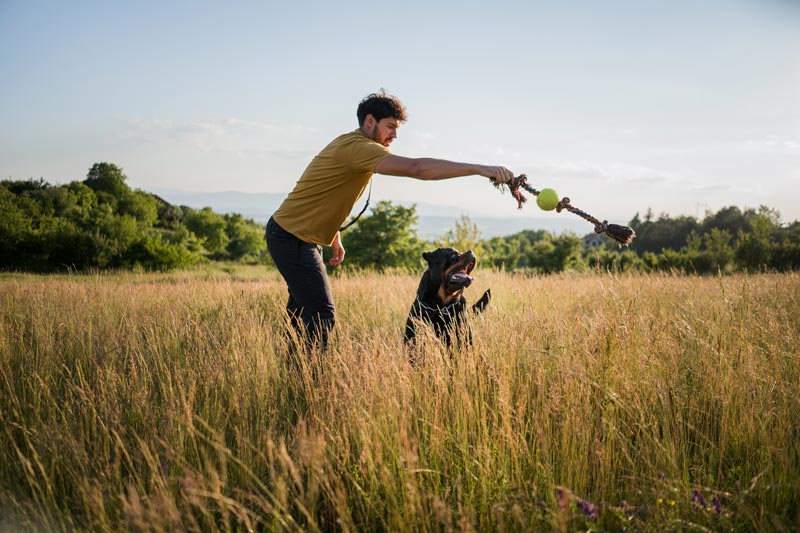Qualities To Look for in a Dog Trainer
Dogs enrich our lives in limitless ways, offering companionship, loyalty, and joy. However, their behavior can sometimes present challenges that create stress between the pet and the owner. Effective training plays a crucial role in shaping a dog’s behavior and fostering a harmonious bond between you and your furry friend. The guidance of an experienced dog trainer can make a tremendous difference in achieving these goals, so it’s critical to understand how to choose the right dog trainer.
Why Choosing the Right Dog Trainer Matters
Selecting the right dog trainer is a decision that can profoundly influence your dog’s long-term behavior, emotional well-being, and obedience. A good professional dog trainer tailors their approach to meet your dog’s specific needs while considering your goals as an owner. Conversely, choosing an unqualified or incompatible trainer can lead to setbacks, frustration, or even harm to your dog’s emotional health.

The methods a trainer employs significantly impact the outcome. For instance, humane, science-based techniques build trust and foster positive behavior, while punitive or outdated methods can lead to fear or aggression in dogs. A skilled dog trainer acts as a guide, ensuring the training process is both effective and enjoyable for you and your pet.
Top Qualities to Look for in a Dog Trainer
Understanding the qualities of a good dog trainer can help you make an informed decision. Let’s explore the essential attributes that define an exceptional trainer.
Professional Credentials and Experience
One of the first aspects to consider is a trainer’s professional qualifications. Look for dog trainer certification from reputable organizations such as the Association of Professional Dog Trainers or the Certification Council for Professional Dog Trainers. A certified dog trainer demonstrates a commitment to ethical and effective practices.
Experience matters, too. A trainer with years of hands-on work with various breeds and behavioral challenges is better equipped to address your dog’s unique needs. If your dog has specific behavioral problems, such as aggression or separation anxiety, a trainer with specialized training in these areas can make a significant difference.
Positive Reinforcement Approach
A clear sign of a great licensed dog trainer is their adherence to positive reinforcement techniques. These humane, science-backed methods focus on rewarding desirable behaviors rather than punishing unwanted ones. This approach not only improves training outcomes but also strengthens the trust and bond between you and your dog. Avoid trainers who use dominance-based methods, as these can cause stress and undermine progress.
Ability to Customize Training Plans
Every dog is unique, and one-size-fits-all methods rarely work. Effective trainers assess your dog’s breed, temperament, and specific challenges to develop tailored training plans. They should also be flexible, adjusting the plan as your dog progresses or as new needs arise.
Clear Communication and Transparency
Clear communication is a cornerstone of successful training. A good trainer will explain their methods, goals, and what you can expect in a way that is easy to understand. They should welcome your questions and ensure that you are comfortable with the process. Transparency builds trust and ensures that everyone—dog, owner, and trainer—is aligned.
Patience and Empathy
Training a dog can be a gradual process, requiring patience and understanding. A skilled trainer demonstrates empathy for both dogs and their owners, recognizing that each dog learns at their own pace. This quality is especially valuable during challenging sessions when encouragement and reassurance are needed most.
Track Record of Success
A proven history of successful training is a strong indicator of a trainer’s capabilities. Look for testimonials, reviews, or case studies from past clients. A professional dog trainer should be willing to provide references or examples of how they’ve addressed issues similar to yours.
Compatibility with You and Your Dog
Training is a collaborative effort, and the dog trainer’s qualities, such as personality and teaching style, should resonate with you. Their ability to build rapport with your dog is equally important. A trainer who understands and connects with your dog’s temperament can create a positive and productive training experience.
Ongoing Support and Education
Training doesn’t end after a few sessions. Look for trainers who offer ongoing support, such as follow-up consultations or additional resources. Additionally, a commitment to continuous learning is a sign of a dedicated professional. The best trainers stay updated on modern techniques and research to provide the most effective guidance.
A Few Red Flags to Watch Out For
When searching for a trainer, it’s just as important to recognize potential negative qualities of a dog trainer that indicate an unsuitable choice:
Punishment-Based Techniques: Avoid trainers who use methods involving shock collars, choke chains, or dominance-based approaches. These can harm your dog’s emotional health and hinder progress.
Lack of Credentials: Be cautious of trainers without recognized certifications or those unwilling to provide references.
Unrealistic Promises: Trainers who guarantee quick or perfect results often oversimplify the complexity of training.
Poor Communication: Dismissiveness or a lack of clarity about methods and expectations is a red flag.
Tips on How to Find the Right Dog Trainer for You
Finding the ideal trainer requires research, observation, and careful consideration. Here are some practical tips:
Research and Reviews
Begin by exploring online reviews, social media, and local recommendations. Platforms like Google Reviews or specialized directories can offer insights into trainers’ reputations and effectiveness.
Ask Questions
When interviewing potential trainers, ask about their certifications, experience, and approach to specific issues. Understanding their methods can help you determine if they align with your goals.
Attend a Session
Observing a class or private session provides firsthand insight into the trainer’s style and interaction with dogs. This can help you gauge their ability to engage with different breeds and temperaments.
Trial Session
A trial session allows you to evaluate compatibility and effectiveness before committing to a longer training program. Pay attention to how your dog responds to the trainer and their methods.
Seek Recommendations
Veterinarians, pet stores, and dog owner communities are excellent resources for finding trusted trainers. Their personal experiences can point you in the right direction.
Give Your Furry Friend the Best Training at K-9 University
Choosing the right dog trainer is a pivotal decision that lays the foundation for your dog’s happiness, behavior, and the bond you share. At K-9 University, we combine years of experience, top-tier certifications, and a passion for helping dogs and their owners thrive together. Whether your dog is a playful puppy or a senior companion, our positive reinforcement methods and humane training practices are tailored to address your unique needs. Serving Plano, Garland, and beyond, we’ve guided countless dogs toward better behavior and healthier relationships with their families. Contact K-9 University today to schedule a consultation and start your journey toward a happier, well-trained dog and a stronger, more fulfilling connection.
